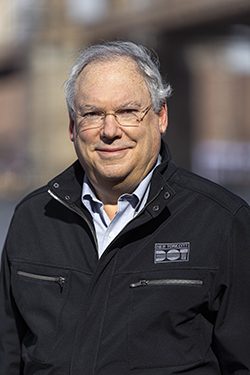
Image Credit: NYC DOT.
On February 3, 2021, Mayor Bill de Blasio appointed Hank Gutman as the new Commissioner of the Department of Transportation. With only eleven months left in the de Blasio Administration, Gutman has set ambitious goals. His past experiences make it likely that he will achieve his goals.
Hank Gutman was born in Philadelphia in 1950, grew up in the New Jersey suburbs, and graduated from the University of Pennsylvania (1972) and Harvard Law School (JD 1975). During Gutman’s freshman year at Penn he participated in a sit-in to protest gentrification. “It was an altogether tumultuous time of social and political upheaval,” he recalls. “The Vietnam War was a major concern, of course. I thought I would go to law school and then use that knowledge to be a public service do-gooder, maybe get into politics. But then I got seduced by Wall Street.”
Gutman clerked for Judge John F. Dooling, Jr. in the Eastern District of New York, and then moved to Simpson Thacher & Bartlett where he became a litigation partner and head of the Intellectual Property Practice Group.
Gutman represented many prominent corporations while at Simpson Thacher. Among the clients were Intel, Polaroid, Cisco, Verizon and Verizon Wireless, Apple, 3Com, Daiichi Sankyo, and Human Genome Sciences.
Gutman’s most prominent litigation took him to the Supreme Court in Lotus v. Borland, 516 U.S. 233 (1996). Gutman’s client Lotus challenged Borland’s copying of the menu command hierarchy used by the Lotus programs. Lotus won in the district court but lost in the First Circuit. The Supreme Court split four to four, with Justice Stevens recusing himself. The case remains a major copyright precedent.
Gutman remains current in his legal field and is an adjunct professor of law at New York Law School where he teaches intellectual property and patent litigation.
Gutman, a 45-year Brooklyn Heights resident, has long been active in Brooklyn’s civic life. As a member of the Brooklyn Bridge Park Conservancy, he helped create the 85-acre Brooklyn Bridge Park on what had been the derelict piers of the Brooklyn waterfront. Gutman glows with excitement when he talks about his years of work in helping to create Brooklyn Bridge Park. He now lives on Furman Street virtually in the park that he helped create.
Gutman’s Park work brought him to the attention of then-Councilman de Blasio. As mayor, de Blasio made Gutman the chair of the Brooklyn Navy Yard and, in 2019, a member of the expert panel on the Brooklyn–Queens Expressway.
The Brooklyn Navy Yard doubled its occupancy under Gutman’s leadership. Gutman’s goal was to “bring quality manufacturing and creative jobs to the city.” Today the Brooklyn Navy Yard has more than 500 tenants, collectively representing about 12,000 jobs that are spread over the 300-plus acre Navy Yard. The businesses, Gutman says, range “from the largest rooftop soil-based farm in North America to the leading maker of body armor for the military … [to] the oldest continually operating spirits distiller in New York.” Gutman is particularly proud of an on-site high school “where kids study in what looks like a place of business and then get summer jobs at actual businesses in the yard.” He also points to a graduate film school program that collaborates with Steiner Studios, one of the earliest tenants of the Navy Yard and the largest film and TV production facility outside of Los Angeles.
Gutman’s service on the Brooklyn-Queens Expressway expert panel was, Gutman says, a “year-long tutorial on the difficulties in dealing with transportation in the urban area.” As a panel member, he was a strong proponent of the panel’s main recommendations: no detour at the Brooklyn Promenade level and a reduction in the number of lanes to create a feasible footprint for the highway. He also was a defender of the integrity of the Brooklyn Bridge Park and of Brooklyn Heights, and an advocate for a broad view of the BQE that considered the entire corridor from Staten Island to Queens.
Gutman joked that he “flunked retirement.” Simpson Thacher has a mandatory retirement age. “There’s one good thing about a forced exit in your early sixties—you still have the energy and enthusiasm to start another career,” he says, adding that “my 100-year-old father, has wisely counseled: ‘The angel of death has a hard time hitting a moving target.’ I think those are words to live by. We all know stories of people who retire and do nothing and end up dying soon after. So why go there when there’s always stuff to do?”
By: Ross Sandler (Ross Sandler is a Professor and New York Law School and the Director of the Center for New York City Law.)


I’ve had the pleasure of knowing Hank Gutman for over ten years, both as a neighbor and at law school reunions, which are held at five year intervals (I’m class of 1970; he’s class of ’75). I know him not just as a superb lawyer and public servant, but also as devoted to his family and friends. I’m confident that he is bringing the same competence and sense of the larger context to his work as Commissioner of Transportation that he did to Brooklyn Bridge Park and the Navy Yard, and hope that our next mayor sees fit to retain him in that position.